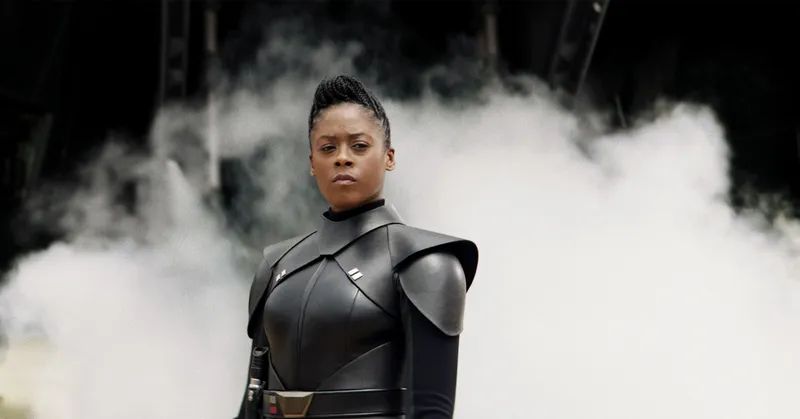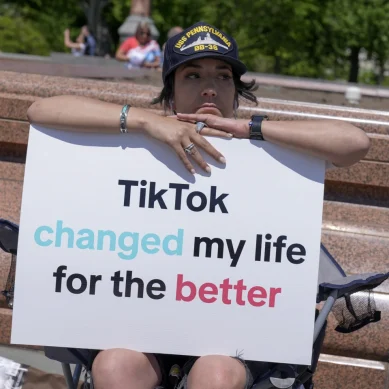
Obi-Wan Kenobi is a Jedi, a member of an old order of beings known for their stoicism. Suffice it to say, if you’ve upset one of them, you’ve made a grievous error. Yet here is Ewan McGregor, the man inside Kenobi’s robes, looking directly at the camera – and he does not look happy.
In the week after Disney+ released the first two episodes of Obi-Wan Kenobi, one of its stars, Moses Ingram, started receiving racist messages on social media and McGregor is feeling “sickened.”
“I just want to say as the leading actor in the series, as the executive producer on the series, that we stand with Moses,” the actor said in a video posted to the official Star Wars Twitter account. “We love Moses, and if you’re sending her bullying messages, you’re no Star Wars fan in my mind.”
McGregor is just the latest – and most high-profile – figure to defend Ingram, who went public on Instagram to talk about the messages she’s received since her first appearance as Inquisitor Reva Sevander, the antagonist on the Disney+ series.
“Long story short, there are hundreds of those. Hundreds,” she said, after sharing screenshots of abusive DMs.
Not only had other people from the Star Wars franchise – including Ahmed Best, the Black actor who played derided character Jar-Jar Binks in the prequel trilogy – spoken out, but so had other celebrities, including Star Trek: Strange New World’s Anson Mount, who called Ingram “a singular talent [who has] been targeted by racists pretending to be fans because her mere existence threatens a skewed, dystopian fantasy.”
A day after Ingram went public about her experience, the Star Wars Twitter account posted a message reading, “If anyone intends to make her feel in any way unwelcome, we have only one thing to say: we resist.” It was followed by a second message: “There are more than 20 million sentient species in the Star Wars galaxy, don’t choose to be a racist.”
This is not anything new for Star Wars fandom – a fact Ingram herself underscored in an interview published ahead of Kenobi’s premiere. The potential for online abuse from racists was “something that Lucasfilm actually got in front of,” the actress said, adding that the studio told her, “This is a thing that, unfortunately, likely will happen. But we are here to help you; you can let us know when it happens.”
They had some experience to draw from. In 2018, Star Wars: The Last Jedi star Kelly Marie Tran deleted her social media after receiving racist and abusive messages; she would later describe the decision by saying, “It was basically me being like, ‘Oh, this isn’t good for my mental health. I’m obviously going to leave this.’”
Three years earlier, John Boyega was defending himself from similar attacks, telling an interviewer, “I’m in the movie, what are you going to do about it? You either enjoy it or you don’t. I’m not saying to get used to the future but what is already happening. People of colour and women are increasingly being shown onscreen. For things to be whitewashed just doesn’t make sense.”
Yet even though the attacks are all too familiar, the reactions to them have evolved somewhat. Lucasfilm’s blunt response to abuse against Ingram was absent in both Tran and Boyega’s cases. Similarly, while two highly visible Star Wars figures – Luke Skywalker himself, Mark Hamill, and Last Jedi director Rian Johnson – spoke out when Tran left social media, both did so obliquely, not explicitly calling out the racism she had faced. (Hamill took to Twitter to post “#GetALifeNerds,” while Johnson responded by decrying “a few unhealthy people [who] cast a big shadow on the wall,” noting that the “Vast majority” were great and, I guess, not racist.)
But there’s also something instructive in Lucasfilm’s more straightforward response to the attacks, one that is, perhaps, a little blind to the franchise’s shortcomings.
The series is, to this day, predominantly white, with the original trilogy, which is still held up as the prime example of what the property can be – featuring exactly one non-white actor in an onscreen speaking role.
That the first movie has only one Black actor, who provides the voice for the movie’s villain, is a whole thing in and of itself. Furthermore, this is a fandom that has made a movement of cosplaying as the faceless soldiers of a fascist regime. The idea that Star Wars is, implicitly, a safe haven of diversity and example of the same is, at the very least, flawed.
So, what can be done? If Disney and Lucasfilm want to rid Star Wars fandom of its toxic elements, the companies will surely need to double down on their efforts: denouncing bigotry more vocally and encouraging others to do the same, preferably without reference to fictional realities.
Placing a greater focus on onscreen diversity, in increasingly visible and important roles, will also be key. They would also do well to remind fans that the Empire/First Order are the bad guys, not aspirational figures.
But those are just the first steps. Star Wars has struggled with the flaws in its fandom for a long time. This week’s tweets and videos are, to be sure, signs that Lucasfilm is attempting to address the racism its actors receive more directly. But some of the change will ultimately need to come from the fans themselves. Then, maybe, Obi-Wan can know peace.
- A Wired report











